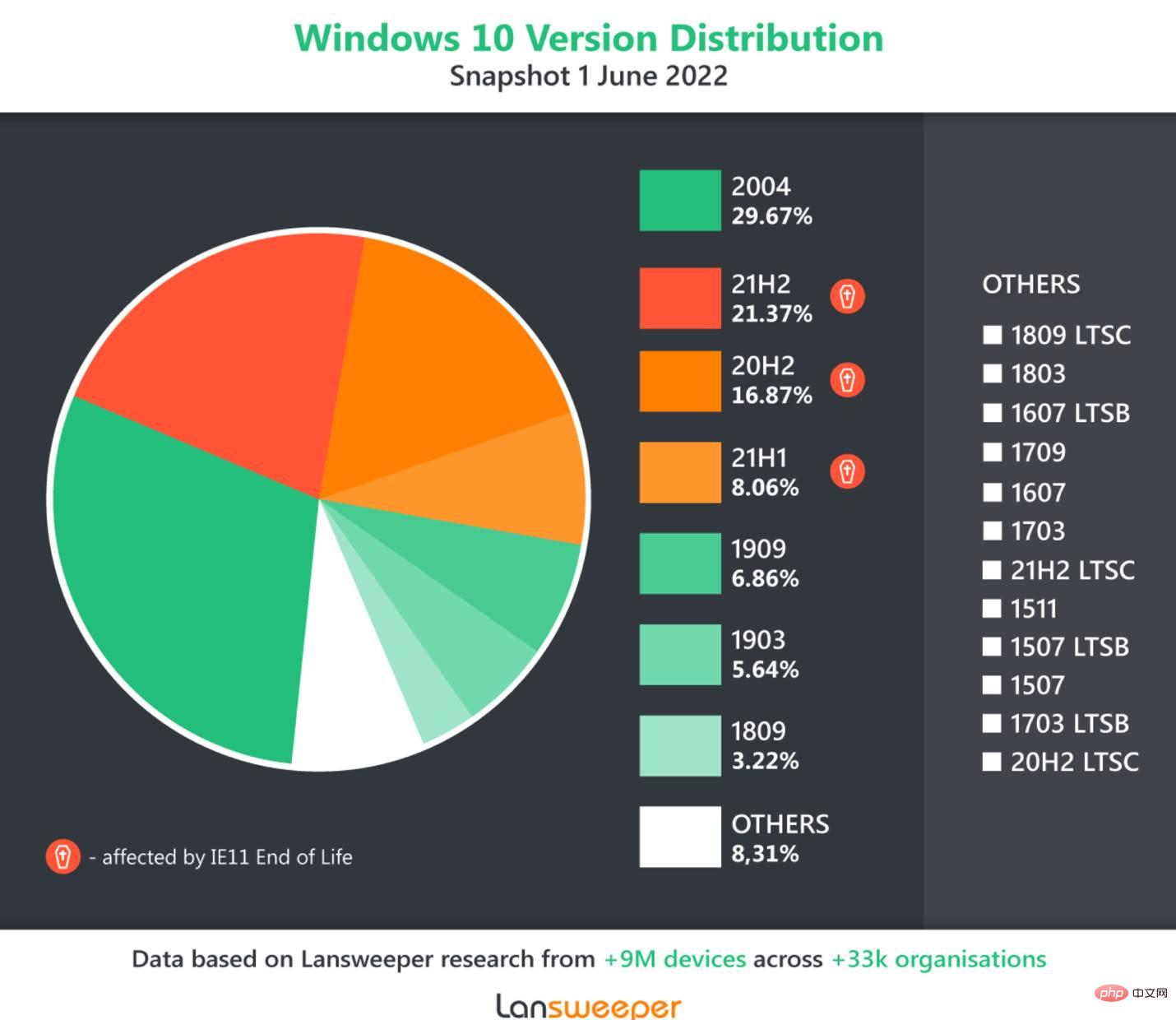
Internet Explorer 11 (IE11) finally ends tomorrow, June 15, and Microsoft is retiring its legacy browser and urging users to migrate to Microsoft Edge. The company also offers IE mode, which allows you to run older websites and applications that must use IE11 to function properly.
Now, the results of a recent survey have surfaced, claiming that up to 47% of Windows 10 enterprise PCs "will" be affected by the retirement of IE11. The claim comes from IT asset management company Lansweeper, which audited 9 million devices across 33,000 organizations.
While Lansweeper says that 47% of Windows 10 PCs will be affected, it's important to clarify what the word "affected" means. In this case, it doesn't necessarily refer to Internet Explorer usage, it simply measures the share of supported Windows 10 versions in enterprise environments, which will be affected in any use case involving IE11.
This definitely does not mean that 47% of Windows 10 PCs now use IE11. Therefore, we believe that the terms "can" or "may" rather than "will" would make this claim more accurate.
The 47% figure comes only from the version distribution of Windows 10 variants that add support in enterprise environments - the corresponding graph for Lansweeper is shown below. It is calculated by adding 21.37% (21H2), 16.87% (20H2) and 8.06% (21H1).

Interestingly, only 21% of Windows 10 PCs have the latest feature update installed, with version 2004 (released in May 2020) leading the way with 29.67% share . If you're wondering why only three versions of Windows have the "Affected by IE11 End of Life" icon, that's because other versions of Windows 10 are no longer supported.
Roel Decneut, chief strategy officer at Lansweeper, had the following to say about the survey results:
From our perspective, only one in five Windows 10 devices is using the latest version, Or that it's not entirely surprising that an Internet Explorer EOL affects so many devices.
Organizations may delay upgrades for a number of reasons, including being more conservative, having more pressing issues to deal with, or simply not being able to understand the operating system version they are running. When Internet Explorer 11 support finally ends, organizations will need an overview of every device they own. Without this data, they will remain vulnerable.
After IE11 support ends tomorrow, Microsoft will retire the browser in two phases. Every time you try to open IE11 directly or indirectly, the first one will redirect you to Edge. It will also ensure that any application using IE11 as the default browser switches to Edge. Microsoft stresses that this won't be done through Windows Update, so there's no use trying to block updates, so you can bypass this redirect. Phase 2 will start immediately after the initial multi-month phase ends, which will completely disable IE11. However, IE11 will not be uninstalled as it still provides the MSHTML/Trident engine supporting IE mode in Edge on Windows 10 devices.
The above is the detailed content of 47% of enterprise Windows 10 PCs could be affected by IE11 retirement tomorrow. For more information, please follow other related articles on the PHP Chinese website!
 What are the network file server tools?
What are the network file server tools?
 Implementation method of vue online chat function
Implementation method of vue online chat function
 How to restore videos that have been officially removed from Douyin
How to restore videos that have been officially removed from Douyin
 Why the computer keeps restarting automatically
Why the computer keeps restarting automatically
 How to recover files emptied from Recycle Bin
How to recover files emptied from Recycle Bin
 How to solve http status 404
How to solve http status 404
 Regular expression does not contain
Regular expression does not contain
 What are the sorting methods?
What are the sorting methods?




